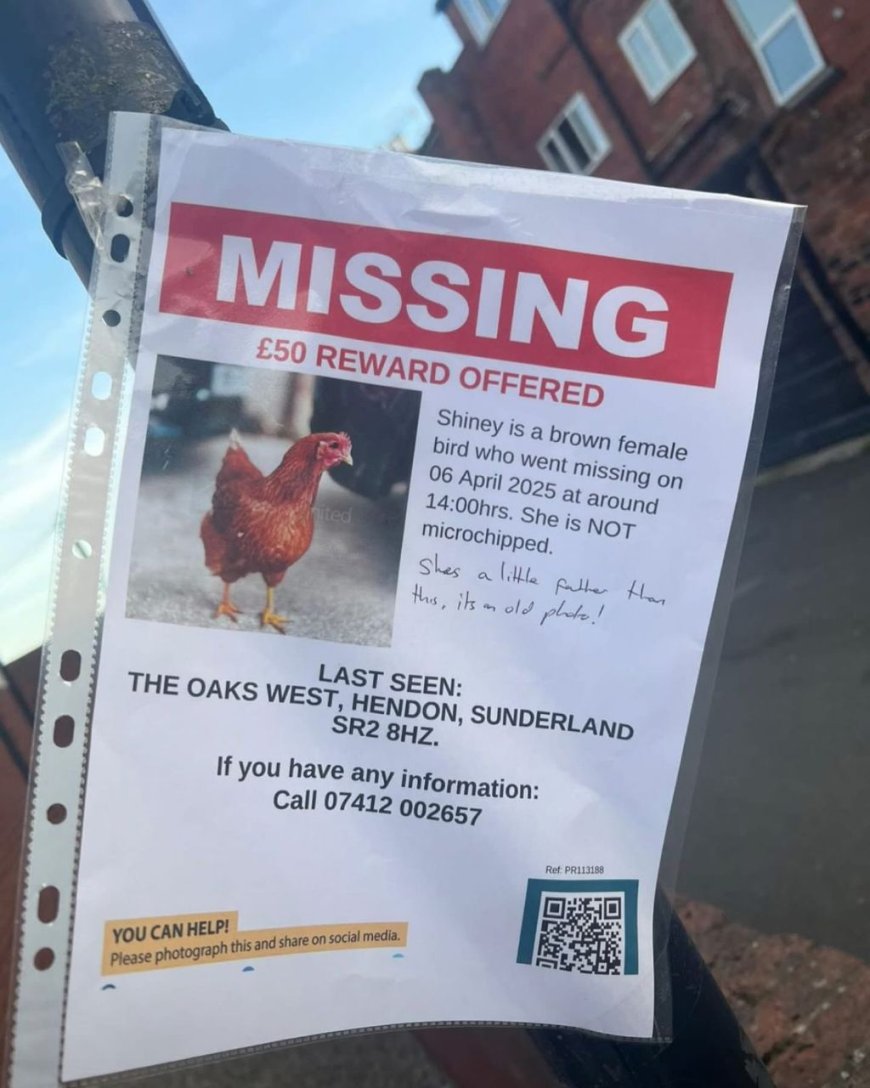A Tale of Two Realities: When a Chicken's Life Matters More Than a Human's
A thought-provoking comparison between the UK's public concern for a missing bird and Nigeria's silence over missing and murdered citizens. This article calls for accountability, justice, and a renewed value for human life in Nigeria.

In a world that often prides itself on progress and civilization, it is shocking to observe the stark differences in how life is valued across nations. A photo recently taken in the United Kingdom shows a missing bird poster—a heartfelt call to the public for help in finding a brown female chicken named Shiney. A £50 reward is offered for her safe return. At first glance, it might seem humorous or even absurd to some, but the message behind it is deeply profound: in the UK, all life is sacred. Even a bird, a common chicken, is worthy of care, concern, and communal effort.
A resident who saw the poster shared, "It might be just a chicken to some people, but to its owner, it's a companion. That's why we help."
Now, contrast this with the grim reality in countries like Nigeria, where the sanctity of human life often hangs by a thread. In a place where news of kidnappings, disappearances, and even mass killings rarely spark more than a fleeting headline, the comparison becomes both painful and enraging. While a bird goes missing in the UK and garners attention, hundreds of humans can go missing in Nigeria without a single outcry or search effort. The difference is not just cultural; it is systemic, institutional, and deeply rooted in governance.
According to a 2023 report by SBM Intelligence, over 3,800 Nigerians were kidnapped in 2022 alone, with hundreds killed during abduction attempts. The Nigeria Security Tracker recorded more than 10,000 conflict-related deaths in 2023, yet many of these cases went uninvestigated and unpunished.
In Nigeria, citizens have been conditioned to accept silence in the face of tragedy. Insecurity has become normalized. From the Northeast ravaged by insurgency to the Southeast plagued by violence and abductions, human lives are lost daily—and yet, the response from leadership is often disinterest, delay, or downright denial. Law enforcement agencies are underfunded or complicit, and justice is rarely served.
A concerned Nigerian citizen lamented, "We see missing person flyers in our communities, but unlike in the UK, no one follows up. It breaks you when your government doesn't care if you live or die."
This is not to say that the UK is without flaws, but there is a clear and intentional societal effort to protect life in all its forms. The missing bird poster is symbolic of a culture that places empathy, responsibility, and community above convenience. It speaks to a system where every life, no matter how small or seemingly insignificant, is treated with dignity.
Meanwhile, in Nigeria, a human being can vanish into thin air and the only response from the authorities may be apathy or bureaucracy. Families are left to mourn in silence. Communities are paralyzed by fear. Leaders offer empty promises while victims are forgotten.
This situation is more than just a contrast—it is an indictment. It reveals a moral crisis, a leadership vacuum, and a deeply troubling disregard for the most basic human right: the right to life.
What's the Wayout?
Nigerians must demand better. Civil society, the media, religious and traditional institutions must rise with one voice to insist on accountability and justice. Life must be valued beyond political speeches and symbolic gestures. Community policing, mental health support for victims, legal reforms, and genuine leadership must be prioritized.
Let Shiney's story be more than a viral moment. Let it be a wake-up call that pushes us to advocate for a Nigeria where every life matters, not just in words, but in action.







